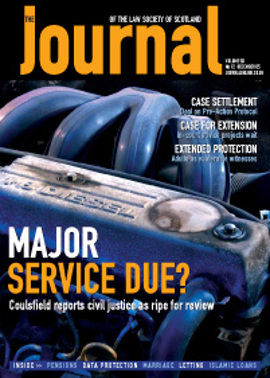Unveiling the Islamic mortgage

While Islamic banking and financial institutions have existed for many years, a substantial expansion of their size and scope has resulted from the rapid economic development of many Muslim states and the attendant growth of private wealth within them: worldwide they now have assets estimated at over £250 billion. Europe’s first purely Islamic retail bank – the Islamic Bank of Britain – opened its doors in London last year, and a number of our own high street banks have either already developed Islamic-compliant products or are considering doing so. HSBC, with its substantial Asian connections, has for example had its own Islamic division for some time.
Asset-based return
Islamic financial institutions derive their practice and procedures from the Shari’a, which might loosely be described as the Islamic canon law. From the financial perspective, its most significant impact comes in the form of prohibitions – on speculation or gambling (which extends to a general prohibition on standard insurance contracts), on investment in prohibited products such as alcohol, and (perhaps most widely known and certainly of most impact in this area) on the charging of interest or riba. “Interest” is only a rough translation of the term (it can also be translated more broadly as “usury”). It essentially looks to the concept that a profit should not be obtained from money itself but rather from the goods or activities in which money is employed: a lender’s return should therefore come from the assets or enterprise in which its finance has been invested and this should include an element of risk sharing. In a sense therefore all Islamic financing can be seen as a joint venture between the lender and the borrower.
Probably the most significant development in the UK within the last few years has been the appearance of Islamic-compliant mortgage products. A number of these have appeared in the English market within the last few years, and my own firm last year undertook the development of what we believe is the first such mortgage product in Scotland.
Routes to market
While all of the existing English products seek to meet the Shari’a requirement mentioned above of involving the lender in the funded property, they do not all approach this by the same route. Indeed, a variety of recognised Islamic financing methods have been drawn upon. The most prominent of these are:
- murabaha – this essentially involves the “lender” acquiring the asset and reselling it to the “borrower” at cost price plus return. The inflexibility of what is in effect fixed funding over the whole term of the “loan” is a significant practical limitation, however, and to my knowledge only one lending institution has adopted this structure.
- ijara – “ijara” is the Arabic word for lease and at its simplest this structure equates to sale and leaseback. The majority of products in the English market have adopted variations on this theme.
- musharaka – this is effectively a joint venture arrangement whereby both parties participate in the ownership of the asset and the benefits flowing from it.
Home-grown solution
When we came to look at the options within the context of Scots law, it was quickly apparent that the English models could not be adopted directly as they stood. As noted, the majority of these proceed on an ijara leasing basis, and in addition involve the lender taking a security over the lease in question. This is by definition impossible in the Scottish context, given on the one hand the effective prohibition on residential leases in excess of 20 years and on the other the restriction of standard securities to “long” leases exceeding this term.
An alternative approach has been developed therefore, utilising the musharaka structure mentioned above. In broad outline, this involves the initial purchase of the property being made by the funder and the “borrower” jointly, in proportion to their contributions to the purchase price. The “borrower” then buys out the interest of the funder over the term of the mortgage arrangement, and during that time the parties enter into a co-ownership agreement under which the “borrower” obtains exclusive possession of the property in return for a further periodic payment. The funding institution also obtains a standard security over the interest of the “borrower” in the property.
This approach has now obtained the required approval in the form of a fatwa from a recognised Islamic scholar – this word has perhaps some ominous resonances for non-Muslims but in fact it simply equates to a legal opinion (and at this point I should perhaps add the disclaimer that neither I nor any of my colleagues claims any qualification in the Shari’a!).
Removing the tax drawbacks
The various structures adopted in England initially suffered from one fairly obvious drawback, namely that as they all involve the lender taking title to all or part of the property this inevitably requires a re-conveyance to the borrower at the end of the day, which would entail liability to a further round of SDLT (and indeed in lease-based structures, stamp duty on the lease element also). The government however declared its intention that there should be a “level playing field” between Islamic and conventional finance and this resulted in the enactment of stamp duty reliefs specifically tailored to the existing Islamic mortgage products in the Finance Act 2003 (sections 72 and 73).
These provisions were brought in prior to the development of the Scottish mortgage product which, given the significantly different structure employed, posed a serious potential problem in that they clearly did not cover this as they stood. Following on a lobbying and consultation process over last winter, the Treasury conceded that this issue required to be addressed and an additional section 72A importing parallel provisions for Scotland made it across the line into this year’s Finance Act, just prior to the dissolution of Parliament for the election.
At present, Shari’a-compliant financial products are still in their infancy in Scotland. The Scottish Islamic Finance Council was established at the beginning of this year, however, including representatives of the Muslim community in Scotland as well as various financial institutions, with the aim not only of promoting general awareness but also of ensuring that Scotland benefits from this rapidly expanding market. On the basis of what has happened elsewhere, the rate of development seems likely to be swift.
Graham Burnside is a partner in Tods Murray LLP and heads its banking department
In this issue
- Holes in Scotland's corporate killing proposals
- A month of contrasts
- Too small to be flexible?
- Engine overhaul
- Vital voices revisited
- Letting in the law
- Puzzles and paradoxes
- Legacy giving in a Scottish climate
- New deal for PI claims
- Data protection crackdown: do you comply?
- In real terms
- Access route
- Better law-making: just lip service?
- Appealing prospects
- The limits of diversification
- Cashing in on the event
- Farewell then common law marriage
- Scottish Solicitors Discipline Tribunal
- Website reviews
- Book reviews
- Unveiling the Islamic mortgage






